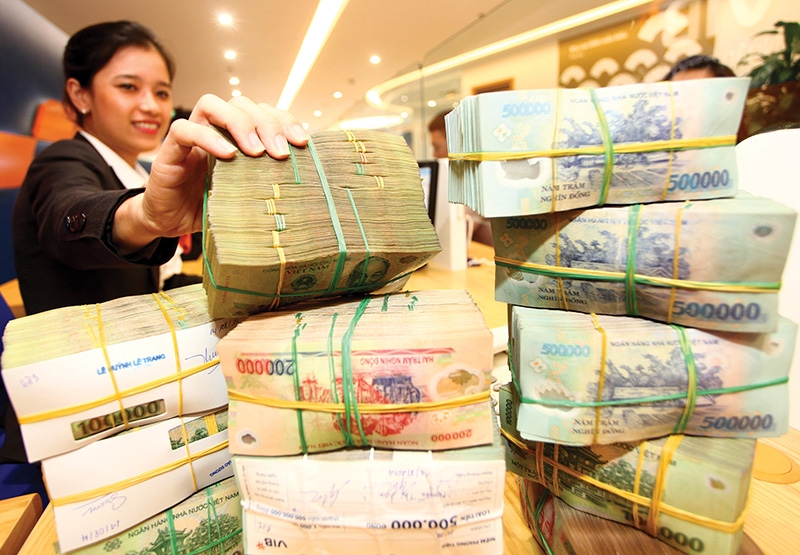Lenders give nod to rate cuts to help out
 |
| Bank customers have been enjoying lower interest rates. Photo: Le Toan |
A group of 16 Vietnamese banks last week have reiterated their commitment to providing more liquidity and cutting interest rates to assist companies and individuals who have been hit hard by the current wave of the pandemic.
ACB is among the first lenders to slash annual interest rates for existing customers to a maximum of 0.8 per cent for short-term loans and 1 per cent for medium- and long-term loans. The bank will assess the impact of the outbreak on a case-by-case basis to determine suitable interest rate reductions for borrowers.
Customers who are subject to interest rate adjustments will be considered by the bank when the loan contract is due to change the interest rate between July 15 and October 15.
At the same time, Sacombank also confirmed a reduction in lending rates of 1 per cent per year for existing customers in industries directly affected by the pandemic such as tourism, travel, transportation, hospitality, education, and healthcare.
“Lower interest rates should only be applied for particularly vulnerable clients. Sacombank has customers with outstanding loans of trillions of VND who are running lucrative operations. Such customers would not be included in this stimulus package,” said Phan Dinh Tue, deputy general director of Sacombank.
Likewise, Agribank also announced further interest rate reductions. The bank estimated it would spend about $239.13 million to help customers weather the storm.
These latest initiatives follow the discussion between the Vietnam Banks Association and 16 credit institutions on supporting vulnerable companies in the face of the new Delta virus variant where banks agreed to reduce interest rates.
Pham Thi Trung Ha, deputy general director of MB, also said that the bank’s customers have been enjoying lower interest rates since early this year to maintain a continuous flow of capital to maintain operations.
According to the Vietnam Association of Small- and Medium-sized Enterprises, while bank loans have never been more affordable than today, they are still higher than businesses’ tolerance level in the context of intermittent liquidity and little to no income. Businesses in the transport and tourism industries are requesting loans with annual interest rates of 0-2 per cent.
While the rate is quite impossible as it is below deposit rates, these requests highlight that businesses are losing resilience and are looking for super cheap capital to stay afloat. They are also complaining that it is too difficult to borrow money from banks. Many financial statements published in 2020 and early 2021 reported that banks are more interested in corporate bonds and retail lending than lending to businesses.
“At present, small- and medium-sized enterprises (SMEs) in Ho Chi Minh City are in a very difficult situation. While unable to generate revenue, they have to pay interest after their loans, rent, and wages. Each day more and more businesses are in urgent need of capital. Other supporting policies are only temporary fixes,” said economist Nguyen Tri Hieu, adding that if no further reductions in interest rates are forthcoming, the most feasible solution would be for the State Bank of Vietnam (SBV) to mobilise joint-stock commercial banks to build a ‘credit complex’ to provide a loan package of $13 billion for SMEs.
He proposed that each bank allocate 3 per cent of their total credit balance to this package and finance loans from demand deposits.
Under this “credit complex” businesses would be allowed to borrow unsecured loans for the first two years and pay in installments over the next three years with low annual interest rates of 3-5 per cent. The $1.3 billion Credit Guarantee Fund for SMEs, which is allowed to guarantee loans up to 10 times its own capital, should provide guarantees for banks to confidently lend to businesses.
Escalating prices are a headache for regulators worldwide as many central banks are considering tightening monetary policies and raising policy rates so they have more room to maneuver in case of another economic downturn. Furthermore, monetary policies could be tightened to constrict spending and curb inflation if an economy accelerates too quickly.
“However, this will be seen more in Western countries, while in Asia, including Vietnam, central banks do not usually cool down overheated economies because inflation is relatively under control. The pressure mainly comes from input prices instead of demand-pull factors,” said Ngo Dang Khoa, country head of Global Markets at HSBC Vietnam.
Notwithstanding, Khoa forecast a potential tightening of monetary policies by the SBV in case inflation consistently exceeds expectations. “Vietnamese enterprises need to continue proactively hedging operations and minimising risks, including exchange rate and interest rate risks, through products officially licensed by the SBV,” Khoa told VIR.
What the stars mean:
★ Poor ★ ★ Promising ★★★ Good ★★★★ Very good ★★★★★ Exceptional
Related Contents
Latest News
More News
- Cashless payments hit 28 times GDP in 2025 (February 04, 2026 | 18:09)
- SSIAM and DBJ launch Japan Vietnam Capital Fund (February 04, 2026 | 15:57)
- Banks target stronger profits, credit growth in 2026 (February 04, 2026 | 15:43)
- Vietnam on path to investment-grade rating (February 03, 2026 | 13:07)
- Consumer finance sector posts sharp profit growth (February 03, 2026 | 13:05)
- Insurance market building the next chapter of protection (February 02, 2026 | 11:16)
- NAB Innovation Centre underscores Vietnam’s appeal for tech investment (January 30, 2026 | 11:16)
- Vietnam strengthens public debt management with World Bank and IMF (January 30, 2026 | 11:00)
- Corporate bond market poised for stronger growth cycle (January 28, 2026 | 17:13)
- Vietnam's IPO market on recovery trajectory (January 28, 2026 | 17:04)

 Tag:
Tag:




















 Mobile Version
Mobile Version